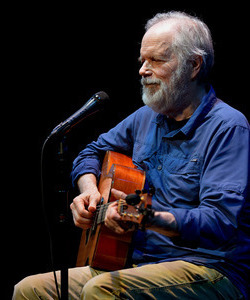Acoustic Guitarist Leo Kottke to Perform at Pepperdine
 Acclaimed guitarist Leo Kottke will bring his unique fingerpicking style to the Smothers
Theatre stage at Pepperdine University in Malibu on Thursday, October 10, at 8 PM.
Acclaimed guitarist Leo Kottke will bring his unique fingerpicking style to the Smothers
Theatre stage at Pepperdine University in Malibu on Thursday, October 10, at 8 PM.
Acoustic guitarist Leo Kottke was born in Athens, Georgia. Raised in 12 different states, he absorbed a variety of musical influences as a child, flirting with both violin and trombone, before abandoning Stravinsky for the guitar at age 11.
After adding a love for the country-blues of Mississippi John Hurt to the music of John Phillip Sousa and Preston Epps, Kottke joined the Navy underage, and eventually lost some hearing shooting at lightbulbs in the Atlantic while serving on the USS Halfbeak, a diesel submarine.
Kottke had previously entered college at the University of Missouri, dropping out after a year to hitchhike across the country to South Carolina, then to New London and into the Navy, with his twelve-string.
Discharged in 1964, he settled in the Twin Cities area and became a fixture at Minneapolis’ Scholar Coffeehouse, which had been home to Bob Dylan and John Koerner. He issued his 1968 recording debut LP Twelve String Blues, recorded on a Viking quarter-inch tape recorder, for the Scholar’s tiny Oblivion label.
After sending tapes to guitarist John Fahey, Kottke was signed to Fahey’s Takoma label, releasing what has come to be called the Armadillo record. Fahey and his manager Denny Bruce soon secured a production deal for Kottke with Capitol Records.
Kottke’s 1971 major-label debut, Mudlark, positioned him somewhat uneasily in the singer/songwriter vein, despite his own wishes to remain an instrumental performer. Still, despite arguments with label heads as well as with Bruce, Kottke flourished during his tenure on Capitol, as records like 1972’s Greenhouse and 1973’s live My Feet Are Smiling and Ice Water found him branching out with guest musicians and honing his guitar technique.
With 1975’s Chewing Pine, Kottke reached the US Top 30 for the second time; he also gained an international following thanks to his continuing tours in Europe and Australia.
With his 1976 self-titled release, he moved to the Chrysalis label. Under Chrysalis, he released 1978’s Burnt Lips, 1979’s Balance, and 1980’s Live in Europe. After 1983’s T Bone Burnett-produced Time Step, Kottke’s contract with Chrysalis ended, and he moved to the Private Music label, later absorbed by BMG and RCA.
The beginning of his tenure on Private Music coincided with the beginnings of a shift in technique, abandoning fingerpicks for fingertips. After 1986’s reflective A Shout Toward Noon, he did not re-enter the studio until recording Regards from Chuck Pink in 1988.
He released an album annually from 1989 to 1991, following My Father’s Face, another T Bone Burnett production, with That’s What and finally Great Big Boy, produced by Steve Berlin. Two years later Kottke returned with Peculiaroso, which featured production by Rickie Lee Jones.
The solo One Guitar No Vocals followed in 1999, but it was his collaboration with Phish bassist Mike Gordon, Clone, that caught audiences’ attention in 2002. Kottke and Gordon followed with a recording in the Bahamas called Sixty-Six Steps, produced by Kottke’s old friend and Prince producer David Z.
Kottke has been awarded two Grammy nominations; a Doctorate in Music Performance by the Peck School of Music at the University of Wisconsin, Milwaukee; and a Certificate of Significant Achievement in Not Playing the Trombone from the University of Texas at Brownsville and Texas Southmost College.
Ticket prices range between $10 and 45 for adults. For additional information about this performance, and to purchase tickets, visit the Center for the Arts website.